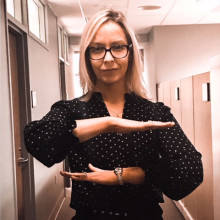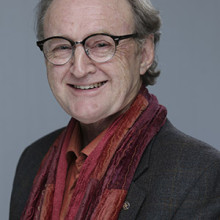Search
Search
International Women's Day 2020
International Women’s Day, taking place on March 8, 2020, is a day to celebrate the various achievements of women around the world and is a call to action for gender parity. This year’s theme is “Each for Equal” to emphasize that each individual has a significant part in working towards a gender equal world.
This year, Lawson is highlighting the different paths for women who are working towards a career in the health sciences. Below are the perspectives from students, physicians and researchers on their contributions to science and medicine.

High school student, Nimrit Aulakh, is completing her co-op placement with Lawson Scientist, Dr. Cheryl Forchuk. Her research focuses on improving mental health care for youth.
“Science has always been of interest to me and has now become significant within my academic endeavours. Part of my desire to become involved in the sciences stemmed from my older sister, who exposed me initially to the research side of science. It is with the help of rationale and logic in science that I can enrich my academic experience. Specifically, I have been working as a co-op student alongside the Mental Health Nursing Research Alliance and learning what it means to be a researcher. During my time, I conducted preliminary analyses on one of their studies, which focuses on improving mental health care for youth through virtual models of care. I will be presenting my findings at the Thames Valley Science and Engineering Fair later this month and if successful, will advance to the Canada Wide Science Fair. This experience has shown me a new side of science, one that I hope that I can continue to be a part of. I realized that through science and research, I can contribute to advancing society. To continue my journey through post-secondary education, I have applied to get my Bachelor’s in Health Sciences. Both within and beyond my four years of undergraduate studies, I hope to continue my contributions in serving the public through scientific research, as well as create an image for girls with the same interests as me, everywhere.”

Romaisa Pervez is a Research Assistant working with Lawson Scientist, Dr. Arlene MacDougall. She recently completed her Master of Science in Epidemiology and Biostatistics at Western University.
“I’m the student lead on a project that’s titled “Building a Sustainable Model and Evaluation for Psychological Rehabilitation in Kenya: An Implementation Study.” I’m working with the CREATE (Community Recovery Achieved Through Entrepreneurism) Kenya team to conduct a study to improve how we deliver, evaluate, and train persons with lived experience or community members to facilitate the Psychosocial Rehabilitation (PSR) Toolkit so it can be locally sustained in Kenya. I’ve travelled to Kenya twice during my Master’s to build relationships with stakeholders and conduct focus groups/interviews. My passion lies in understanding how we can implement upstream initiatives for mental health that are both sustainable and effective. Furthermore, I want to explore how we can find leverage points within the current mental health system in low to middle income countries and create innovative solutions. In the near future, I want to pursue medicine and further my knowledge and build stronger skills in this field.”

Dr. Kelly Anderson is an Associate Scientist at Children’s Health Research Institute, a program of Lawson. She is also Assistant Professor in the Department of Epidemiology & Biostatistics at the Schulich School of Medicine & Dentistry, Western University.
“I lead a research program in public mental health research, with a primary focus on young people experiencing a first onset of psychotic disorder. Together with my team, we are investigating the distribution and risk factors for psychotic disorders, prevention in early psychosis, and access to care and utilization of services in first-episode psychosis. My research program is centered around mentorship and training of students from all levels, and I work with trainees to foster high-level skills in the design and analysis of epidemiologic studies using large complex datasets. I am committed to fostering a culture of equity, diversity, and inclusion within my research team, and I advocate strongly for gender and early career representation for awards, scientific symposia, and other career opportunities. As a female scientist, I regularly mentor young women, both formally and informally, and due to the focus of my research, I also regularly work with trainees with lived experience of mental disorders. The diverse experiences and perspectives of these students both inspire and inform our work together.”

Dr. Michelle Barton-Forbes is an Associate Scientist at Lawson and a Physician at London Health Sciences Centre (LHSC) specializing in paediatric infectious diseases. She is also an Assistant Professor at the Schulich School of Medicine & Dentistry, Western University.
“My research program is focused on the clinical epidemiology of infectious diseases in children, particularly in vulnerable paediatric populations such as neonates and young infants. A secondary area of interest is in bacterial resistance and antimicrobial stewardship. Through engagement in multicentre research and contribution to national guideline development, I am able to make a difference in the management and prevention of common childhood infections nationally. The combination of intense passion for my subspecialty, inquisitive curiosity and a drive to better understand common childhood illnesses is infectious to my students. I motivate my students to excellence by inspiring them to believe in themselves and their ability to make a difference. My students are encouraged and challenged to find answers to unanswered questions and unexplained trends through research. As a proud Canadian and an immigrant from a nation that prides itself in its diversity, I believe that diversity is our strength. The Jamaican national motto “out of many one people” has framed my worldview and has influenced my practice.”

Dr. Eileen Crowley is a Scientist at Lawson and a Pediatric Gastroenterologist at LHSC. She is also an Assistant Professor at the Schulich School of Medicine & Dentistry, Western University.
“My research interests include pediatric inflammatory bowel disease (IBD), the genetics of IBD, big datasets, therapeutic drug monitoring clinical trial endpoints and precision medicine. My work has served to be better delineate the genetic phenotype of children with IBD as well as optimizing response to therapy in this age group. I engage students and motivate them to work with enthusiasm! My aim is to create learning opportunities that are active, collaborative and promote learning relationships. Once I have identified a student’s goal, it is easier to share and attain that goal. Within the research setting, I aim to maintain an environment where every student feels accepted, valued and safe. Sharing of ideas creates opportunities whilst also fostering a sense of personal belonging and achievement.”
To learn more about International Women’s Day, visit https://www.internationalwomensday.com/.
Jamie Fleet
Jamie Fleet, MD
Assistant Professor, Schulich School of Medicine and Dentistry
Stroke
Dr. Jamie Fleet is a physiatrist at Parkwood Institute and an Assistant Professor in the Department of Physical Medicine and Rehabilitation at the Schulich School of Medicine and Dentistry at Western University. Dr. Fleet completed medical school as well as residency training in Physical Medicine and Rehabilitation at McMaster University. She is currently enrolled in a Master’s program in Clinical Epidemiology through the Health Research Methodology program at McMaster University with a focus on fracture treatment and prevention in older patients after stroke. Her primary clinical area of focus is in stroke rehabilitation.
Though still early in her career, Dr. Fleet has developed a strong research background, primarily focusing on drug safety studies in older adults using large data through ICES. Her other research interests include exercise and health promotion/prevention strategies in patients after stroke, as well as fall prevention strategies and pain management. "

Joining the team
For Diana Lemaire, her long-standing professional role collided with a personal journey when she was diagnosed with colon cancer in 2015.
Her career has focused on the areas of care, education, quality and evaluation in different departments of London’s health delivery and research community.
“I’ve always had a curiosity and interest in how we know what we are achieving and how we are performing and improving over time”
With this spirit, she approached her battle with cancer as an observer of the process. Four years later she is in remission and has become an active Patient Partner with the cancer program, lending the whole scope of her experience and expertise to this work.
Seeing the importance of research in health care, she has started participating as a Patient Partner with Lawson Health Research Institute. She has reviewed grant proposals and also joined a taskforce looking at how to engage patients in research.
Gaining momentum
Over the last decade, there has been a major shift in the way that patients are getting involved in hospital-based research – and not just as study participants.
The term ‘patient-oriented research’ is gaining traction and has emerged as the next evolution in health care research. Involving patients across all aspects of a research project is shown to not only provide positive opportunities for the patient, researchers and health care system as a whole, but also improve health outcomes.
Image


What is patient engagement?
Patient contributions to research activities were traditionally restricted to the role of research participant, such as participating in a clinical trial or donating tissues. This voluntary role is a vital contribution to science and the ability to continually improve care.
In recent years, patient engagement has evolved into a meaningful collaboration between patients and researchers, as patient partners become involved at different stages of research projects. This could be advice on a research question or study design, development of the research proposal or executing certain parts of a research project.
Kirk’s story

Patterson is a cancer survivor following his journey with head and neck cancer, and served as the primary caregiver for his late mother. Professionally, he has worked in the university setting and supported co-op placements for students including in research labs.
“This has become a healthy passion for me, and I’ve been involved as much as I can,” explains Patterson. “I was honestly surprised when they asked for me to share my opinion as a reviewer and really serve as a partner at the table.”
He sees the patient as a vital addition to the research team, able to provide a completely unique experience and perspective. “It is so important for those with lived experience to get involved. They are the ones with the first-hand knowledge of the patient or caregiver journey, and can offer feedback that otherwise wouldn’t be represented.”
One area Patterson sees as an opportunity is offering patient-to-patient support when someone is considering getting involved in research. “It’s incredibly beneficial for them to hear from someone who’s been through it. And, ultimately, this enhances the research project.”
Why involve patients?
Involving patients in all aspects of a study ensures that the research being conducted is relevant and valuable to the people that it is meant to impact. Patient partners can also collaborate with the team to summarize and share results in a way that target audiences will value, and also with policy makers or other decision makers who can help apply the results more widely.
This approach puts patients and families at the centre. Researchers, health care providers, decision makers and patients actively collaborate to create positive changes for people’s health.
Michelle’s story
Michelle Solomon is a Patient Partner who has drawn on a variety of roles and experiences to join research teams as they prepare proposals for funding. She has lived experience as a patient and has worked as a registered nurse in the field of mental health. She is also now a PhD student and research assistant studying the mental health care system.
“It was nice to be asked. I was able to contribute feedback at a level where you can really make a difference as to how the research project will unfold, and if it will be successful in receiving funding,” says Solomon.
She adds that it was interesting to see the process and how the grant proposal was improved by having many different people offer feedback. “The end results are enhanced when you complete that kind of group consultation and evaluation. It’s much better than going at it alone.”
Patient engagement at Lawson
For the past two years, Lawson has been working collaboratively with London Health Sciences Centre's Patient Experience Office and St. Joseph’s Health Care London's Patient & Family Advisory Councils to engage with Patient Partners who are interested in the research aspect of health care.
The goal is to help Patient Partners become involved in research at the level they choose, whether that is being involved as a reviewer for a research competition or collaboratively working with the research team to support various areas of the research study.
Everyone benefits
Patient Partners bring an important perspective and valuable expertise to the research and can enhance its relevance and feasibility. In turn, taking an active role in how health care is designed and delivered offers patients a sense of fulfillment.
Researchers are the experts when it comes to the design of a strong research project; however, the research is being conducted for the benefit of patients.
“Researchers are very knowledgeable and have the big picture of how a research project will unfold. But they don’t have the perspective of being a study participant or how a study will impact patients in unanticipated ways,” shares Diana Lemaire.
“You will always benefit from having someone with lived experience on the team.”
Patient Partners involved early in the study design can identify ways to boost recruitment, and ensure that participants stay engaged and comply with the study protocol.
Lemaire notes that the Patient Partners themselves bring skills and backgrounds that will only serve to enrich the research process and its overall success.
“The core of patient engagement is that patients are involved in decisions that affect them. There is an important opportunity here for patient partners to play a vital role on research teams.”